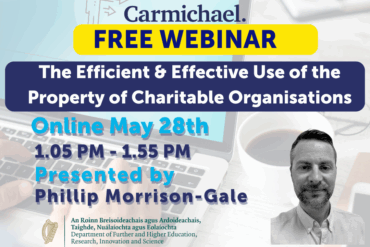We’re hiring.
Corporate Governance Officer & Company Secretary – Carmichael Centre, Dublin
The role: Ensuring governance compliance, supporting the CEO, and keeping the board running smoothly across Ireland’s leading nonprofit hub.
Hours: 37.5 hours per week | Mon–Fri | Hybrid working available
What we’re looking for: Someone with a strong grasp of corporate governance, excellent organisational skills, and a genuine passion for the nonprofit sector.
Salary: €40,000 per annum | Pension scheme with up to 5% employer match | 24 days annual leave
Closing date: 27th February 2026 (5pm)
Interested? Send your CV and a short cover letter to info@carmichaelireland.ie
Full job specification is available here.
We’re hiring.
Facilities Assistant (Afternoons)
Carmichael Centre, Dublin
The role:
Quality housekeeping and facility support across our busy centre
Hours:
20 hours per week | Mon-Fri, 1pm-5pm
(Flexibility for occasional Saturdays – time off in lieu provided)
What we’re looking for:
Someone reliable, detail-oriented, and committed to maintaining excellent standards in a vibrant nonprofit hub.
Closing date: 11th February 2026
Interested?
Send your CV to lee@carmichaelireland.ie
Join us on 24th February 2026 for the online course, ‘Understanding Protected Disclosures‘.
- Understand the Protected Disclosures Act 2014 (as amended) and its direct relevance to your role.
- Learn to identify what constitutes “relevant wrongdoing” and who is considered a “worker” under the Act.
- Explore proper procedures for making and receiving disclosures, both internally and externally.
- Discover the crucial safeguards protecting individuals who speak up.
- Understand your charity’s fundamental responsibilities in developing effective policies and reporting channels.
- Gain strategies to cultivate a robust “speak up” culture that benefits your entire organisation
Register now
Affordable Office Accommodation for Nonprofits at Carmichael
Looking for office space for your nonprofit organisation? Carmichael House currently has three desks available in our bright and spacious co-working office space.
- Annual Fee: €1,874 per desk
- Quarterly Payment: €469
- Desk-sharing options are also available for added flexibility.
Interested? Contact derek@carmichaelireland.ie to arrange a viewing or for more information.
Why Choose Carmichael?
Located across two buildings on North Brunswick St and Coleraine St in Dublin 7, Carmichael is home to 42 Resident Nonprofits. Our residents benefit from:
- Affordable, high-quality office accommodation
- Access to shared facilities
- A collaborative environment with opportunities for knowledge-sharing with other nonprofits and our team.
Join a supportive community and be part of Carmichael. Get in touch today!
View https://www.carmichaelireland.ie/about-us/vacancies/ for more information on current Community Employment (CE) vacancies.
CE Positions
All our Community Employment positions are supported by on the job training and accredited QQI training to help individuals build new skills and enhance their employability. Participants work 19.5 hours per week gaining meaningful work experience while also upskilling in specific roles.
In order to be eligible for Community Employment applicants must be 12 months in receipt of a social welfare payment and over 21 years of age. For more details on eligibility and pay see Citizen’s Information.
If you are interested in applying please contact your local INTREO office and quote the reference number for the position you are interested in with a case officer who will determine your eligibility and refer you for the position.
The winners of the Carmichael Good Governance Awards 2025 will be announced at our Awards Ceremony on November 19th.
Book your free ticket here!
This year, 122 nonprofit organisations entered their annual reports into the Good Governance Awards. The awards are divided into 7 categories based on the annual income of the organisation.
The winners will be announced at the Awards Ceremony which will take place from 5.30pm to 8pm on November 19th in Chartered Accounts Ireland (House, 47-49 Pearse St, Dublin 2, D02 YN40, Ireland).
Book your free ticket here!
Well done and good luck to the shortlisted finalists:
Category 1: for organisations with an annual turnover of less than €100,000.
Chronic Pain
Dark Sky Ireland
Niteline
Category 2: for organisations with an annual turnover of between €100,000 and €250,000.
Kilkenny Volunteer Centre
Louth Volunteer Centre
Parentline
Wexford Volunteer Centre
Category 3: for organisations with an annual turnover of between €250,000 and €750,000.
Suas Educational Development T/A STAND
Breaking through CLG
Irish Development Education Association
Category 4: for organisations with an annual turnover of between €750,000 and €2.5 million.
Spraoi agus Spórt
Belong To LGBTQ+ Youth Ireland
Outhouse LGBTQ+ Centre
AHEAD
Marie Keating Foundation
Category 5: for organisations with an annual turnover of between €2.5 million and €10 million.
National Adult Literacy Agency
Womens Aid
Early Childhood Ireland
The Jack and Jill Children’s Foundation
Category 6: for organisations with an annual turnover of between €10 million and €50 million.
Kare – Promoting Inclusion for People with Intellectual Disabilities
Irish Cancer Society
LauraLynn, Ireland’s Children’s Hospice
Barnardos Republic of Ireland
Oxfam Ireland
Category 7: for organisations with an annual turnover of over €50 million.
Cluid Housing
Focus Ireland
GAA
Goal
Rehab
If you would like to join the mailing list, sign up here.
Read the latest July 2025 dilemma here.
For an example of a previous Governance Dilemma, see below:
Governance Dilemma
Amy is a new member on the Board of a nonprofit which provides youth services. At the first Board meeting she attended, a Board member named David was asked to manage the procurement process for a significant project to upgrade the space the organisation uses to hold activities. At her second Board meeting, David informed the Board that the procurement process had been completed and that his own company provided the cheapest and best value quote. David announced that in order to manage any potential conflict of interest, he would step down from the Board for the three months that the project would take and would return to the Board afterwards. The Chair thanked David for being mindful of conflicts of interest and moved onto the next item.
David has been a Board member for 5 years and is very widely respected in the nonprofit. Amy does not want to offend him or the Chair but is concerned that the Board did not see the quotes provided by all suppliers and that David managed a procurement process which he then quoted for. The project is very time sensitive due to restrictions on the grant funding and Amy isn’t sure if it is worth bringing up her concerns since there probably isn’t time to change things.
What should Amy do?
Michael Moriarty’s response:
Consider the nonprofit’s own standards
I’d suggest the first thing that Amy should do is to examine the organisation’s own policies and processes concerning conflicts of interest to see if they have been followed in this case. Is there a board manual? Check if it has guidance on how conflicts of interest are declared and managed. Is there a specific Conflicts of Interest policy?
External standards applicable to the nonprofit
Amy should also ask about her board colleagues about external reporting standards and requirements that might apply to this issue. This project is grant funded. She can ask what the donor’s expectations are concerning the management of potential conflicts of interest. Is there anything in the grant contract on the matter?
Charity regulator guidance and best practice
Even if the nonprofit doesn’t yet have internal processes or policies on managing conflicts of interest, the good news is that the Charities Regulator has provided extensive guidance. The Charities Governance Code addresses how charities should manage conflicts of interest. It is covered under Principle 2 of the Code; “Behaving with Integrity”.
Other considerations- delegations of authority and board appointments
Amy should also consider what are the practices in the organisation on delegating tasks to the board. Running a procurement process would usually be a management function. However, in small nonprofit organisations with few staff or no staff, functions like this are often delegated to board members. But is there a schedule to determine what are staff duties and what are board duties? How are such delegations to board members usually determined? When tasks like this are delegated, what oversight is there from other board members?
The practice of resigning from a board for 3 months and then rejoining also seems unusual. How are board appointments provided for in the organisation’s constitution? It is difficult to argue that an individual is separate and independent from a board and organisation when there is agreement that they will rejoin the board after a short period of time.
Next steps…
As a new board member, Amy seems hesitant to raise this issue and possibly offend fellow board members. But new board members like Amy are often well placed to view issues with a fresh perspective and to challenge existing practices. The approach suggested above should give Amy plenty of material to discuss with the Chair and her fellow board members, in addition to her own judgement. But she should also exercise her own judgement. Delaying a project is likely to be less damaging that not adequately managing a conflict of interests.
In my view the conflict arose in Amy’s first board meeting when the procurement task was delegated to David. This is because it appears that David failed to disclose to his fellow board members that he owns a company that operates in the area and that his company would potentially submit a bid. If I was a member of that board, I’d seek for the procurement process to be started again with a clear “terms of reference” and scoring scheme. If board members are required to manage the process, I’d seek at least two unconflicted board members to do so, and exclude any potentially conflicted board members from decisions on the matter. I’d also seek to put in place a new or revised conflicts of interest policy in line with the guidance from the Charities Regulatory Authority.
Gerry Culligan’s Response:
Amy, as a new Board member, is right to be concerned in relation to the fact that a Company in which fellow Board member David is involved has been successful in the procurement process for a significant project to upgrade the space the organisation uses to hold activities. In addition, the procurement process was managed by David himself as a result of a Board decision at the previous Board meeting.
The Charities Code of Conduct states that Charity trustees must not act in order to gain financial or other benefits for themselves or for any persons connected to them such as their family, their friends, or any organisation that they own, manage or work for. David has acted in favour of his own organisation which is clearly a conflict of interest.
In this circumstance the Conflict of Interest Policy should apply and assuming that such a policy exists it should state that where a conflict arises either in advance of, or during a meeting of the board of charity trustees, the individual with the potential conflict should declare it immediately to the Chairperson and Secretary of the board if possible in advance of the meeting, or to the full board of charity trustees during the meeting. In fact, this conflict of interest should have been declared by David at the first Board meeting prior to the commencement of the procurement process.
Failing to effectively manage conflicts of interest can negatively impact the charity in terms of governance and associated reputational risk, where a conflict interferes with a charity trustee’s actual or perceived ability to comply with his or her duty to act in the best interests of the charity. It is important to remember that the board of charity trustees is collectively responsible for the oversight of the charity. As such, if you know another charity trustee is conflicted, and it is not declared, it is your duty to speak up.
Consequently, it is Amy’s duty to raise this matter directly with the Chair as there is a clear conflict of interest which arose at the first Board meeting when David was appointed to lead the procurement process. He should have declared a conflict at that time and stepped out of the process. The fact that the project is time sensitive is a secondary consideration.
Marion Courtney’s Response:
Amy is “not asleep at the wheel” and I am glad to see that she is uncomfortable with what has happened between her first and second Board Meetings and doing her due diligence into the matter. However, it places her in a delicate situation. Her concerns, albeit as a new Board Member, are valid, as they address important governance, oversight and conflict of interest issues that might arise within the Board. I suggest that she should take action, but do it “diplomatically”, as she is new to the Board,
Although things may not change at this stage, given the time constraints of this project and restrictions on the grant funding, she should raise her concerns about the procurement process directly with the Chair before escalating the matter to the wider Board, as she may not know all of the facts or rationale behind the decision, being new to the Board. I would advise her to “proceed with caution” on this occasion, all the while being curious. In addition, she does not wish to offend either the Chair or David. However, the circumstances as outlined, have led her to believe that this has not been a fully “transparent” procurement process.
Ask for more information on the procurement process that was completed – questions are a good way of obtaining information and no question should be deemed invalid on a Board, particularly as she is a new Board Member, and needs to have a better view of the decision-making process that occurred between her first and second Board Meetings:
1. Ask to see the “conflict of interest” policy, if there is one? In fact, she may not have seen it during her Induction process.
2. Was a subcommittee of the Board set up to manage the project?
3. Did it meet to review the quotations received? Was there a scoring matrix and clear criteria in place for comparison of quotations, and making the final decision?
4. Did David remove himself from the room, and abstain from voting when the final decision was being made?
5. Did the subcommittee receive at least 3 quotations for the work, to be in a position to decide that David’s company provided the best value quote?
6. Has the decision and reason behind it been documented fully in the Minutes of the subcommittee meeting? Has the wider Board seen these Minutes?
In the hope that the Chair is open to her line of questioning about the process, she could also suggest establishing more transparent conflict of interest procedures for similar situations in the future. As a new Board Member, Amy has a responsibility to ask questions and ensure that proper governance processes are followed, even though she might be uncomfortable bringing up this matter. It will protect the organisation in the long term, particularly if they have to obtain and justify grant funding to cover this project. The time sensitivity of the project is important, but proper governance protects the organisation in the long term. It is probably too late to change the decision now, but at least Amy will have outlined her concerns, should a similar situation arise in the future, in line with best practice in the non-profit sector, which increasingly finds itself under scrutiny. If the Chair is not responsive, and the decision is made, then as a final resort, Amy could bring up the matter again at her third board meeting, expressing her concerns more publicly, but not challenging the decision. Managing conflicts of interest in non-profits is crucial for maintaining transparency and trust with the funders and general public.




